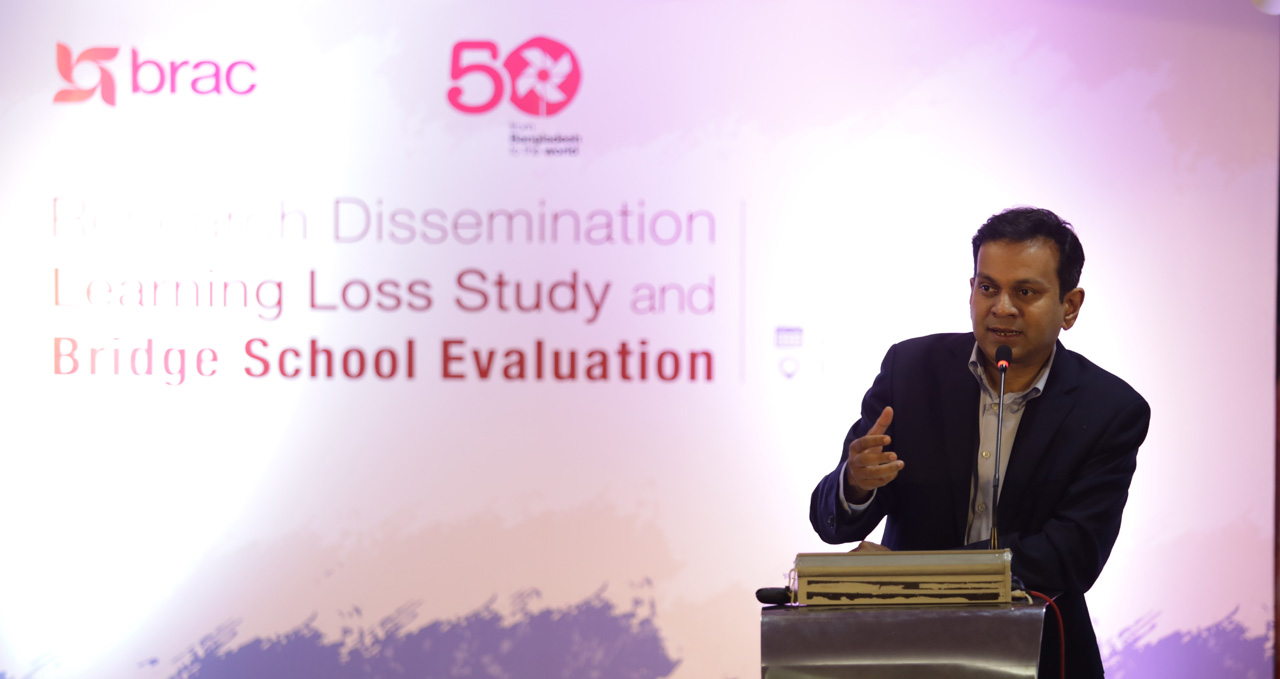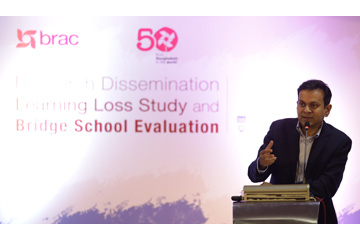
On Thursday, 23 June 2022, BRAC organised a research dissemination event, “Learning Loss Study and Bridge School Evaluation” at BRAC’s head office in Mohakhali. In this event, findings of two studies on BRAC Bridge Schools and learning loss were presented.
BRAC firmly believes that everyone has the right to education. The organisation is moving forward in leaps and bounds to ensure access to primary education for every child. BRAC Education Programme has launched an innovative model called "Bridge School" in 2014. Children from marginalised communities get left behind when it comes to education. With that in mind, the non-formal primary education (NFPE) model was initiated for children who have never been enrolled in any school or have dropped out of primary school at an early stage. Children who have some literacy, knowledge in numeracy and have dropped out of school are included in a bridging course and then they are enrolled in either Class 2 or Class 3 as per their learning qualifications. In the Bridge model, a five-year course of primary education is followed in an intensive method so that children can gather knowledge in a short period of time. In the Bridge model, a four-month bridge course is conducted for Class 2 students. The goal of this course is to overcome students' learning loss and improve their primary knowledge.
A study was conducted to understand how effective this course is. Under BRAC’s supervision, a team of international researchers used Annual Status of Education Report (ASER) tools to evaluate the learning of BRAC Bridge School students. According to their data, it was found that BRAC Bridge School students were ahead in Bangla and Mathematics compared to their Indian counterparts. This assessment was completed in 2021, when Bridge School students – like others from around the world – were at a risk of severe learning loss (due to prolonged school closures since 2020).
Some notable findings of the evaluation of BRAC Bridge Schools include:
- Bridge School students have better skill in reading short stories compared to Indian students (53% relative to 50%)
- Bridge School students are more competent in division math compared to Indian students (63% relative to 28%).
- A significant difference was found when Bridge School students’ short story reading and division math skills were compared to their counterparts from different upazilas/thanas (story reading skill 34% to 85% and division math skill 35% to 89%)
- The performance of urban school students in division math is significantly weaker than those of rural students
The study was led by Stephen Heyneman, emeritus professor at Vanderbilt University, USA; John Richards, professor of public policy at Simon Fraser University, Canada; and Shahidul Islam, a doctoral student at Queen’s University. They all gave a presentation at the event titled, “BRAC Bridge School Evaluation”.
John Richards said, “The Bridge model is targeting children who have dropped out of a government school or have never been enrolled. Most of the children are from low-income families. At present, about 20% of children never finish primary school. One important success of Bridge Schools is that they probably have better reading and math results than the average government schools.”
Stephen Heyneman said, “I have worked in 65 countries and seen many schools. I can say that Bridge Schools were clean, colourful and provided a happy learning space. Children wanted to be there. Learning should be joyful; and these schools had all the materials. We noticed that the teachers all used innovative techniques to connect with parents who used their phones and learned how to monitor their children’s learning. I have not seen that level of control and contact anywhere.”
Shahidul Islam said, “The four-month bridging course that BRAC’s Bridge School model offers to dropout children to put them back on the education track, helps them progress toward graduation that is unique in the world. This model has huge potential for replication in resource-poor settings/countries. It can immensely help in achieving the UN’s Sustainable Development Goal 4 in countries where school dropout is a major challenge.”
Another study was conducted to evaluate the learning loss of children in Bangladesh where Samir Ranjan Nath, programme head of BRAC IED, conducted the ‘Literacy Test’. In this study, Nath found that the enrollment rate in pre-primary schools was 62.7% in 2020, which has come down to 49.6%. Although 96.2% students participated in primary in 2020, it has come down to 93.6% in 2021. Before the COVID-19 pandemic, the rate of female student participation was higher than that of male student participation in pre-primary – which has now declined. After schools reopened, 79.7% students participated of whom 78.6% were in primary and 80.6% were in secondary schools. The attendance rate was found higher for girls than for boys. In rural areas it was 80.9% but in urban areas it was 77.5%.
Samir Ranjan Nath presented his findings on learning loss at the event. He added, “Learning loss is a reality. The question is how fast can we recover from it. This can start with assessment of learning levels of all students, categorise them and prepare recovery strategies as per students’ needs. Parents, peers, retired teachers and temporary teachers can be utilised -- keeping the regular teachers at the centre. Follow-up assessments of students can help understand the progress and take necessary actions.”
Prof Md Farhadul Islam, Chairman, National Curriculum and Textbook Board (NCTB) was a special guest at the event. He said, “We who work in the education sector - we believe in working collectively. Research is very important to evaluate the situation of our education. We will request BRAC to share their findings so that we can use their learning and gather information from them. We will go forward collectively. We are working on a plan to reduce learning loss. In this case, collaboration is necessary.”
Md Nuruzzaman Sharif, Director (Joint Secretary), Bureau of Non-Formal Education (BNFE), Ministry of Primary and Mass Education, was also present at the event. He commented, “The findings are very important for all of us who are working in the education sector. With the recommendations of the two presentations, we will work together with BRAC and others, and learn from their suggestions; and with that we will complete our two running projects.”
Mr Md Muhibur Rahman, Additional Secretary (School) at the Ministry of Primary and Mass Education was present at the event as the chief guest. He said, “The Bridge School Evaluation presentation was done on a BRAC school programme. I don’t have much to comment on it. Our education system is suffering from multifaceted problems. I will put emphasis on the recent problems: school closures and learning loss. It is still too early to comprehensively evaluate these, we are at an early stage. But I believe we can find a solution together if we all work collectively and share our learnings to go forward.”
Asif Saleh, Executive Director of BRAC Bangladesh, was the chair at the event. He said in his closing note, "The impact on learning caused by the school closure during the pandemic is profound. We need to collectively work together to recover the loss of learning and get the education of both children who have dropped out and children who may potentially drop out back on track, especially girls, children with disabilities, and children from ethnic communities. The learnings from our proven Bridge School model along with the findings of BRAC IED's learning loss study will benefit policymakers and practitioners on ways to accelerate learning and build our education systems back better."









